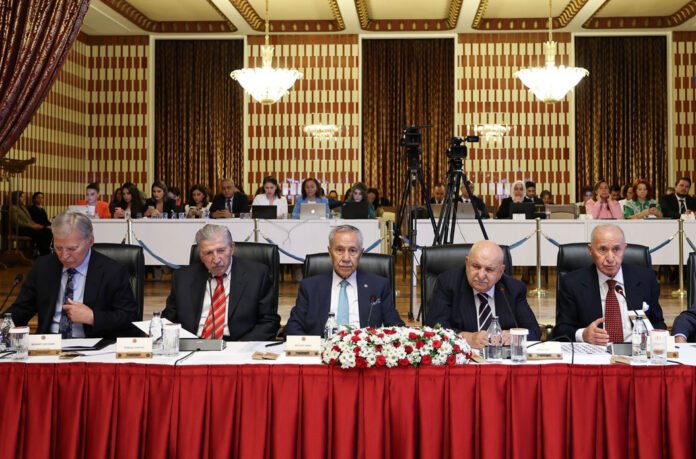Bülent Arınç, once a founding Justice and Development Party (AKP) heavyweight and close ally of President Recep Tayyip Erdoğan, on Wednesday called for urgent reforms to address the suffering of tens of thousands of people dismissed from public service after a coup attempt in Turkey in 2016, the TR724 news website reported.
The remarks came during a meeting of the National Solidarity, Brotherhood and Democracy Commission on Wednesday, which gathered 11 former parliament speakers to discuss reconciliation efforts and legal reforms.
“Those dismissed by decree-laws are experiencing great suffering. Even those acquitted cannot return to their jobs,” said Arınç, who served as speaker of Turkey’s Grand National Assembly from 2002 to 2007 and as deputy prime minister between 2009 and 2015 under then-prime minister Erdoğan.
He urged lawmakers to strengthen freedom of expression, implement rulings from Turkey’s Constitutional Court and the European Court of Human Rights (ECtHR) and consider a general amnesty.
The ECtHR has issued multiple rulings faulting Turkey’s handling of post-coup purges, but implementation has been limited.
In the aftermath of the 2016 coup attempt, the Turkish government launched massive purges across the public sector. According to the Justice Ministry, more than 127,000 people were dismissed from public service. Fewer than 20,000 have been reinstated through a government-appointed appeals body known as the State of Emergency Procedures Investigation Commission (OHAL Commission).
The purge primarily targeted people accused of ties to the faith-based Gülen movement, though Kurds, leftists and other government critics were also affected.
Turkish President Recep Tayyip Erdoğan has been targeting followers of the Gülen movement, inspired by the late Muslim cleric Fethullah Gülen, since corruption investigations revealed in 2013 implicated then-prime minister Erdoğan and some members of his family and inner circle.
Dismissing the investigations as a Gülenist coup and a conspiracy against his government, Erdoğan began to target the movement’s members. He designated the movement as a terrorist organization in May 2016 and intensified the crackdown on it following the abortive putsch in July of the same year that he accused Gülen of masterminding. The movement strongly denies involvement in the coup attempt or any terrorist activity.
The judiciary also saw sweeping changes, with 4,006 judges and prosecutors dismissed in the aftermath of the coup attempt, reducing judicial staffing from 12,000 to around 8,000. More than half of current judicial personnel now have fewer than five years of experience, the minister said.
The purge of judges and prosecutors following the coup attempt is seen by many as one of the main reasons for the erosion in the rule of law in the country, where even the rulings of the ECtHR are disregarded, and members of the judiciary are accused of acting on orders from the government.















